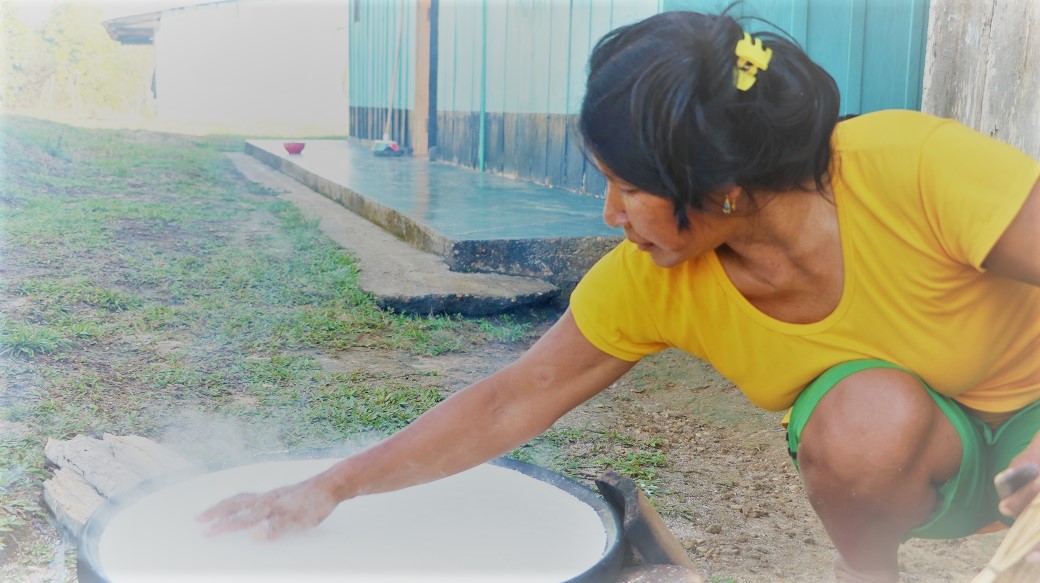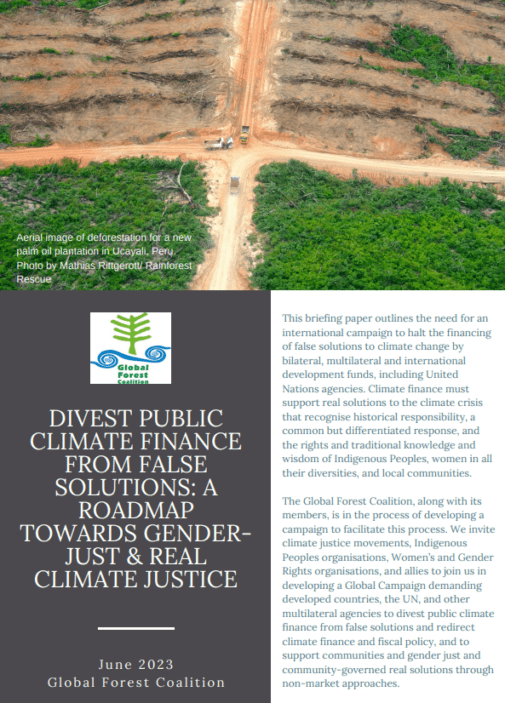Rights and Resistance
Turning forests into fuel for the new ‘bio-economy?’
What Really Happens When Forests are Commodified
– Voices From Around The World
I) Women and Climate Change – Mujeres y Cambio Climático – Falsas Soluciones (Español)
————————————
Women are particularly vulnerable to the effects of climate change, and to the ‘false solutions’ to climate change that have been prioritised in international negotiations. These false solutions allow countries in the Global North to keep on polluting, whilst exacerbating environmental and social problems elsewhere. In particular, proposed mechanisms include the further expansion of monoculture tree plantations, which hit women in rural communities especially hard, as land, fertile soils and water are becoming increasingly scarce, making it ever harder for women to feed and care for their families. The video also focuses on the substitution of fossil fuels by agrofuels produced from soy beans, sugar cane, and oil palm, which results in even higher carbon emissions. Communities in Latin America, and especially women, who depend on subsistence farming, are having to confront the widespread use of toxic agrochemicals, growing scarcity of land, lack of employment opportunities and expulsion from their land, as a direct result of agrofuels production. The video concludes that fighting against climate change is a way of fighting for the rights of women; and fighting for the rights of women is another way of fighting for climate justice.
Produced by Gender CC, Women for Climate Justice with the support of the WRM International Secretariat, Directed by Flavio Pazos 2011
Related video:
i) Let’s define forests by their true meaning
———————————–
Restrictions on access to mangrove forests in the Sundarbans, Bangladesh – one of the world’s biodiversity hotspots – has affected the traditional livelihoods of forest dependent peoples. Under pressure from corrupt officials from the Forest Department, dacoits (bandits), money lenders, and more affluent boat owners, traditional forest users are pushed into exploiting the mangroves beyond sustainable limits, thus harming and affecting this rich ecosystem. Moreover, climate change hit hard in this area in 2007 and 2009, and the government banned traditional resource users’ entry to the forest for six months, forcing locals to change their occupation, migrate to the cities or enter the forest illegally. Outsiders are still reportedly removing resources indiscriminately, without permits or under illegal arrangements with forest officials. But people are organising themselves and are establishing co-operatives, with the help of Unnayan Onneshan and Forest Peoples Programme. They are more aware of their rights and are starting to improve their lives and conserve the valuable Sundarbans.
Idea: Rashed Al Mahmur Titumir, Direction Mohammed Abdul Baten – Unnayan Onnoshan. 2012.
III) REDD: Indigenous Peoples not allowed to speak at UNFCCC-10 December 2008
This video shows the way in which the UNFCCC uses procedure to prevent a representative from the Indigenous Peoples’ Organisations from taking the floor in Poznan during COP-14 of the climate change negotiations, in 2008. The Climate Action Network is allowed to speak, and so is the International Youth Delegation, and both speak to the issue of indigenous rights being negotiated out of the climate change agreements. But the indigenous representative is not allowed to speak. At the same time the UNFCCC purports to support the ‘importance’ of listening to civil society.
News Reel filmed by Rebecca Sommer, Sommer Films, for Earth Peoples. 2008.
IV) Climate Change from the voice of Indigenous Peoples
————————————
This video contains snapshots as well as perspectives of indigenous participants to the climate change meeting in Copenhagen COP15, including the historic climate march. Indigenous peoples reject false solutions to climate change, such as REDD and REDD+ mechanisms which violate their rights; they are the world’s smallest carbon contributors suffering at the expense of the largest contributors. The Indigenous perspective is vital to the global conversation.
www.nativechildrensurvival.org. 2010.
V) Se nos acabó la parte humana (In Spanish) – Our humane side is gone
———————————–
Environmental Indigenous leader Salatiel Mendez together with his wife and child were killed in Cauca, Colombia, a region known for its violence and constant repression of Indigenous and local communities. This video presents images of the place where he was shot and presents testimonies from people who knew him, talking about his commitment to protecting forests, which are increasingly under threat from commodification, and Mother Nature, and the way he brought equilibrium to the community in El Tablazo. Salatiel coordinated the Indigenous guard protecting the watershed of the Isabelillo river as well as coordinating efforts to protect the reserve of San Jaonda, which was set on fire. He constantly risked his life to defend nature and many other leaders are threatened. These communities are trying to construct a peaceful processes of resistance; they invite dialogue and want to reduce violence and hatred.
Produced by Tejido de Comunicación, ACIN. 2012.
VI) Una Resistencia Cantada (In Spanish) – Announced Resistance
————————————
In September 2007 a journey through Colombia’s South Pacific Region, the Chocó (one of the world’s biodiversity hotspots) showed evidence of megaprojects destroying afro-communities’ livelihoods and territories. In the first part of this video community members reject the introduction of coca crops on their lands and the subsequent militarisation and fumigation of the area by the government. The second part focuses on the sale of land for extensive monoculture palm oil plantations, which has been pushed hard by the government. Communities reject this monoculture model which leaves them without food, pollutes their water streams and jeopardises their traditional livelihoods. They also say no to the proposed deep water port which the government is planning to build without their Free, Prior and Informed Consent (FPIC): they demand sound alternatives in line with their traditions and cultures. Diversity for freedom!
Proceso de Comunidades Negras PCN – Colombia. Censat Agua Viva, FoE Colombia, supported by Ecofondo. Jesica Toloza. Edition Karen Roa. 2008.
VII) Forests, much more than a lot of trees – Bosques, mucho más que una gran cantidad de árboles (In Portuguese and French w/ Spanish subtitles)
———————————–
The FAO’S definition of forests effectively states that forests are nothing more than a collection of trees, a convenient definition adopted throughout the UN and by governments and companies. This definition allows the wholesale conversion of forests to lifeless monoculture plantations of exotic tree species, which are, after all, just a collection of trees. This is not accidental, since it facilitates corporate interests in the timber and agrofuel sectors. However, it completely disregards the stark impacts that losing genuine forests has on community life around the world. This video collects testimonies from forest-dependent men and women in Brazil, Congo, and Indonesia. They describe what forests really mean to them, how they relate to the forests and the resources in the forests in order to live. They also describe the huge impact it will have on their lives if their forests are destroyed or taken away from them. Plantations can never fulfill these functions, plantations are not forests!
Directed by Flavio Pazos for World Rain Forest Movement. 2011.








